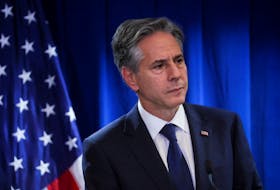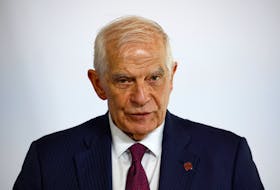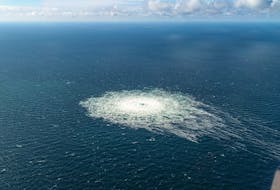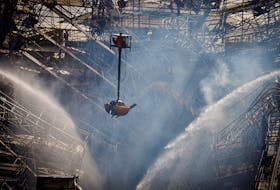Monday, Oct. 8
No hearing because of Thanksgiving Holiday
Tuesday, Oct. 9
Economist Wade Locke told the inquiry Tuesday he stands by his presentation — an early assessment of the Muskrat Falls project — even if he wishes the public talk in January 2012 had never happened. A lecture theatre at Memorial University of Newfoundland’s St. John’s campus was packed for that presentation, titled, “’Muskrat Falls: The best option?’ A public forum.” The public forum never happened, but Locke spoke about his own understanding of what the project entailed based on a review of the public information.


“On the balance of probabilities, it seems reasonable to me to assume that Muskrat Falls is the best option for the province,” he said at the time. He wasn’t paid for his presentation.
But on Tuesday, Locke was asked about other financial arrangements dating from November 2003 to December 2017, including a total of just over $615,000 in contracts with the provincial government involving Wade Locke and Wade Locke Consulting, and just under $332,000 involving Strategic Concepts, a company Locke has contracted with.
He clarified consultant work payments.
“I don’t believe that any of these contracts, I was being hired for political patronage or to channel money to me in order to influence my particular views,” he told the inquiry.
Locke’s 2012 commentary was later used by politicians to promote the project.
Locke said he was “vilified” in public, and the personal nature of the commentary has affected him emotionally and psychologically.
Read full story: Wade Locke regrets 2012 presentation
Wednesday, Oct. 19
On Wednesday the “us” versus “them” on Muskrat Falls hydro came to the surface. There were glimpses before on the record, of the sides and the division: voices publicly pro-project and the people speaking against it, with varying reasons on both sides. The “cheerleaders” in favour, versus the “bottom feeders” opposed — in their words.
Ron Penney, a former St. John’s solicitor and city manager, and David Vardy — a former chair of the Public Utilities Board — were called as witnesses. Both are known for their opposition to the project. Speaking on behalf of the Concerned Citizens Coalition the pair reiterated their desire for greater public debate before Muskrat Falls was sanctioned and their view more consideration could have gone to options to bring the province through to 2041 when Churchill Falls power plant expired. They said the province could have tapped power there for domestic use.

Vardy said the Muskrat Falls hydroelectric development downstream should not have been exempted from full PUB review.
“We just didn’t need that project,” Penney said.
Former premier Kathy Dunderdale’s lawyer Erin Best challenged public statements from Vardy and Penney about an earlier Grant Thornton audit report for the inquiry — claims of certainty the Muskrat Falls project should not have been sanctioned.
Both men had their expertise questioned by lawyer Tom Williams, who represents
a collection of elected officials in power during the time of the Muskrat Falls project’s sanctioning and construction (a handful of former Tory ministers and premiers from 2003 to 2015, not including Dunderdale, but including Paul Davis, Tom Marshall and Danny Williams).
The pair said they did not know everything about the project but have tried to gather evidence showing alternatives explored.
Former premier Williams told reporters little weight should be given by the commissioner to Vardy and Penney. “They’re criticizing for the sake of criticizing, and nobody is safe from that,” he said.
Des Sullivan (Uncle Gnarley) told reporters Vardy and Penney can say a great deal with credibility, and while he did not testify, what he has said and done is in the public domain.
Under questioning by Nalcor Energy lawyer Dan Simmons regarding using electricity from the larger Churchill Falls power plant when contracts around its use expire in 2041, Penney responded that the province should consider expropriating Quebec’s interest in Churchill Falls (Labrador) Corp.
Simmons said that would likely be subject to “a long legal fight with Quebec.”
Read full story: Concerned Citizens face grilling at Muskrat Falls Inquiry
Thursday, Oct. 11
Roberta Benefiel of the Grand Riverkeeper Labrador and Labrador Land Protectors once again brought the concerns of the grassroots groups in relation to the Muskrat Falls project.

With Benefiel’s comments there were also exhibits, supporting documents and a written submission about a history of involvement with the project and topics from methylmercury to fears of a failure in the North Spur (the land narrowing the Churchill River at the project site, subject to extensive “stabilization” work).
“In our view, provincial and federal politicians have sacrificed the sustainability of the province’s natural capital in exchange for short-term economic gains, and economic gains for the province that may in fact never be realized,” read the submission, now available online. Benefiel said there was always a feeling they were not being heard.
“I think people are defeated. It’s a David and Goliath situation. You know, people who work full-time jobs and have children and houses to look after, they don’t have the time to get involved in these things,” she said, highlighting the volunteer hours put in, trying to understand and respond to concerns.
In his interpretation of the terms of reference for the inquiry, Commissioner Richard LeBlanc said he would look to establish what environmental review work was undertaken but would not investigate “correctness.”
LeBlanc was attentive to her throughout, Benefiel noted. And he wasn’t the only one, with group members and supporters following via livestream.
“You should see my phone,” she said with a quick laugh, touching her hand to a Labrador flag dangling around her neck.
Testimony from Philip Raphals from the Helios Centre testimony was not finished during the day and he is expected back Friday for cross-examination.
Read full story: Labrador activist repeats concerns
October 12, Friday
Philip Raphals, executive director of the Helios Centre, was back on the stand suggesting an incomplete review of the proposed hydroelectric project before its sanction in 2012, but he acknowledged there were detailed documents he was not aware of from that review process, from the period after he was retained.

Raphals said more could be done to aggressively manage energy use in the province. He also suggested the alternative to Muskrat Falls considered by the Public Utilities Board — the “isolated island” option — did not properly consider additions of wind power.
“I think everyone acknowledges Newfoundland has a world-class and very extraordinary wind resource,” he said. “So, then the question is: what can you do with that?”
Nalcor Energy lawyer Dan Simmons directed him to a detailed timeline for the “isolated island” power plan, as it was reported by Manitoba Hydro International (MHI) in late 2012, before a final decision. But it would have been produced internally, after Raphals’ review of provincial energy plans, and Raphals said he was not familiar with it.
The later report showed the alternative options to Muskrat Falls hydro being considered included successive wind power projects and replacements of existing wind power generation. Simmons noted there is also existing wind power on the island system.
Raphal’s credentials were reviewed by Simmons on the record — Raphals has a bachelor of arts degree and a master’s degree in music, but no training in public policy, engineering, finance, law or energy-related fields. As noted in his CV, he became a freelance science journalist (to 1992) and eventually moved into consulting work as an independent energy analyst, founding the non-profit Helios Centre. He has a 20-year history of energy analyst work, including appearances before regulators across Canada.
Raphals was brought in to address his involvement in the environmental review and work for the Grand Riverkeepers, and that he was given room to speak about any concerns with the project as it was presented. And he could be recalled as needed to speak about any of his past, related commentary.
Read the full story: Independent analyst completes testimony at Muskrat Falls Inquiry
Related stories:
NOTE: This is an edited version, to clarify the story related to Philip Raphals was focused on his cross-examination, and to note his past appearances before energy regulators across Canada.








